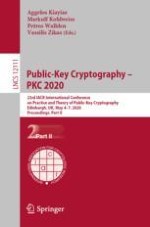2020 | OriginalPaper | Buchkapitel
Threshold Ring Signatures: New Definitions and Post-quantum Security
verfasst von : Abida Haque, Alessandra Scafuro
Erschienen in: Public-Key Cryptography – PKC 2020
Aktivieren Sie unsere intelligente Suche, um passende Fachinhalte oder Patente zu finden.
Wählen Sie Textabschnitte aus um mit Künstlicher Intelligenz passenden Patente zu finden. powered by
Markieren Sie Textabschnitte, um KI-gestützt weitere passende Inhalte zu finden. powered by
